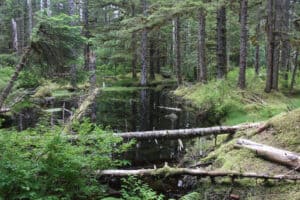In sustainable landscaping and gardening, the choice of mulch plays a pivotal role in nurturing a healthy and vibrant outdoor space. Organic mulch and inorganic mulch are two distinct options, each with its set of characteristics and benefits. Both serve the same purpose and within either category, there are many options to choose from to suit your needs best. In this article, we delve into the differences between organic and inorganic mulch and focus on why you should buy organic mulch for your yard or garden. Further shedding light on why organic mulch is superior for conscientious people who prioritize the well-being of their yards and the environment.
Inorganic Mulch vs. Organic Mulch: Why You Should Buy Organic Mulch for Your Yard or Garden
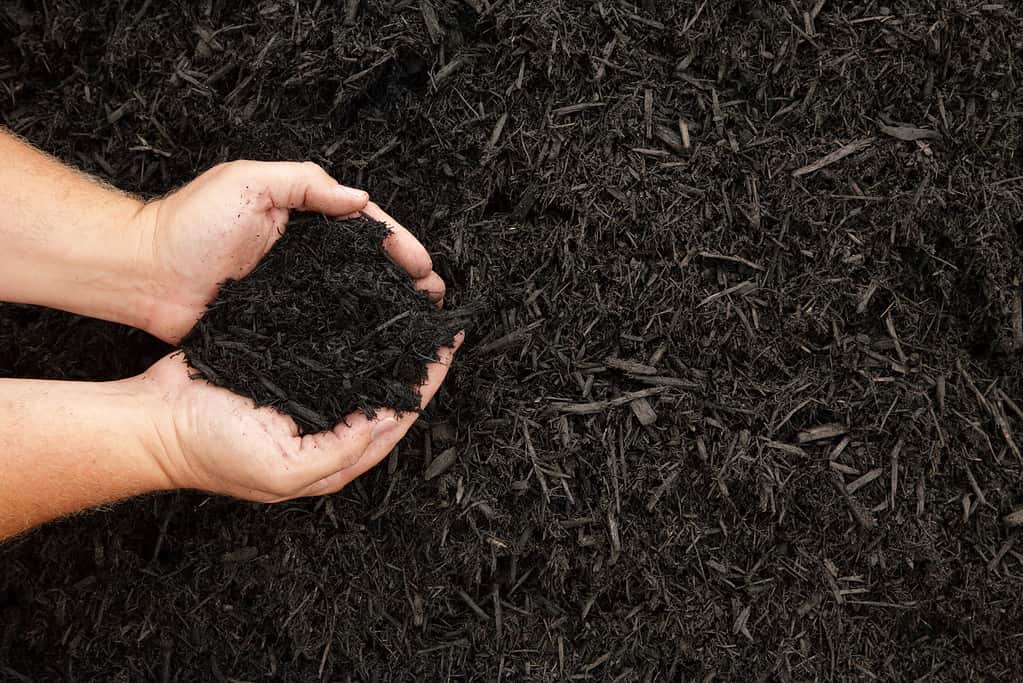
Organic mulch is a natural asset to gardeners and landscapers.
©iStock.com/witmerphotography
Organic Mulch For Your Yard
According to eOrganic, organic mulch is an environmentally friendly material derived from natural, living materials that are decomposable substances, such as leaves, wood chips, bark, pine needles, straw, and compost. Its composition aligns harmoniously with the principles of sustainability and the cycle of nature, making it a favored choice for those with eco-conscious intents.
The key attributes of organic mulch are as follows. First, organic mulch breaks down over time, enriching the soil with essential nutrients and organic matter. This process improves soil fertility and promotes healthy plant growth. Next, one of the remarkable features of organic mulch is its ability to suppress weeds by blocking sunlight and hindering weed germination. This natural weed control method reduces the need for chemical herbicides. Moreover, organic mulch acts as a moisture-conserving blanket for the soil, reducing water evaporation. This is particularly valuable in water-scarce regions, contributing to water conservation efforts.
Furthermore, organic mulch helps maintain a stable soil temperature by insulating the soil. This protects plant roots from extreme heat or cold, fostering an optimal growing environment. Organic mulch also provides a habitat for beneficial organisms like earthworms, insects, and microorganisms. These creatures play a vital role in soil health and nutrient cycling. Lastly, organic mulch’s natural textures and earthy tones add an aesthetic appeal to your landscape, creating a blend of organized organic material with the natural world.
Inorganic Mulch For Your Yard
In stark contrast to organic mulch, inorganic mulch is comprised of non-decomposable materials that can be synthetic or natural, such as rubber, plastic, gravel, rocks, pebbles, and landscape fabric. While it may seem like a convenient option, especially in terms of longevity, inorganic mulch has significant drawbacks.
First, inorganic mulch does not decompose or contribute to soil enrichment. It remains inert and does not enhance the soil’s fertility or structure. Often, it can even cause soil compaction due to its weight or create a barrier between the soil and the elements. This can make planting a problematic feat and cause nutrient deficiencies. Moreover, it can suffocate soil from sunlight, water, and temperature changes. This can further cause a significant decrease in bioavailability and kill helpful organisms. Inorganic mulch, like organic mulch, can be effective for weed management. However, due to its nature, it can starve soil, as previously mentioned.
Furthermore, on water retention, inorganic mulch does not retain moisture effectively. It lacks the water-conserving properties of organic mulch, leading to increased irrigation requirements. In hot climates, materials like rubber mulch can absorb and retain heat, potentially harming plant roots and contributing to soil temperature extremes. Lastly, many inorganic mulch options, especially rubber and plastic or fabric varieties, are derived from non-renewable resources and may release harmful chemicals over time, posing environmental risks.
Now, let’s explore the 16 reasons why you should buy organic mulch for your yard or garden over inorganic mulch.
1. Organic Mulch Mimics Nature
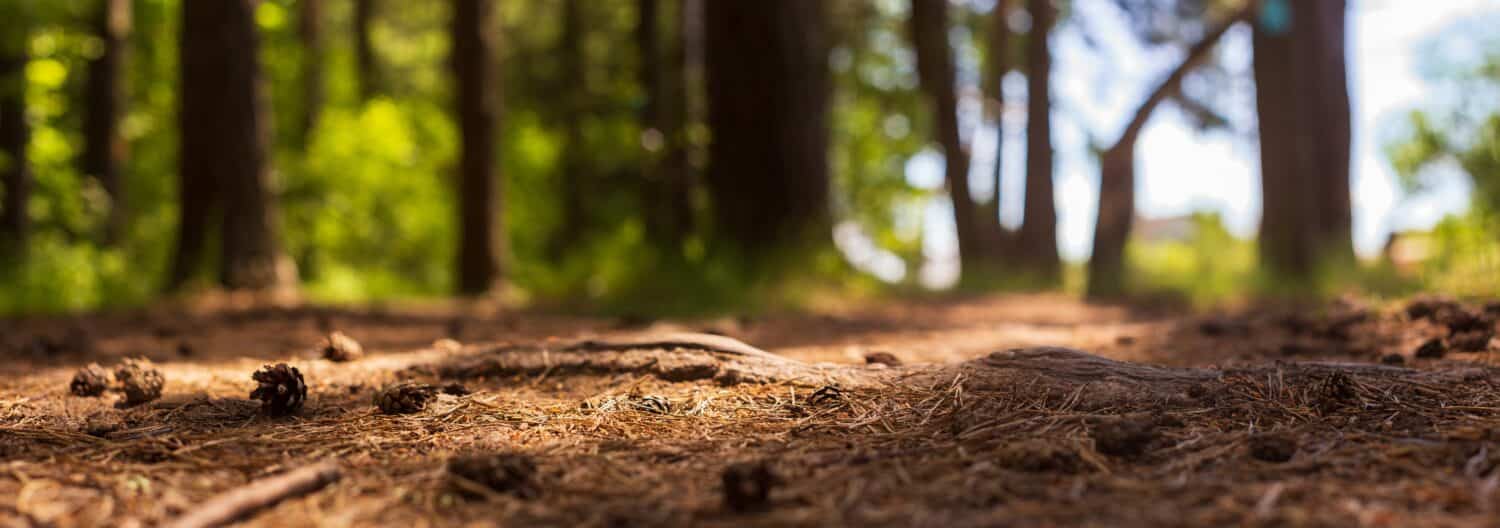
Made of natural decomposable materials, organic mulch mimics nature.
©Shaplov Evgeny/Shutterstock.com
Organic mulch stands as an example of mimicking nature as much as possible in our gardening and landscaping practices. In the natural world, fallen leaves, branches, and other plant materials accumulate on the forest floor, gradually breaking down and enriching the soil. Organic mulch replicates this process, creating a harmonious cycle of decomposition and renewal in your yard.
By imitating nature’s ways, organic mulch fosters a thriving ecosystem beneath the soil’s surface. As it decomposes, it provides a steady supply of nutrients to your plants, encouraging robust growth. This ecological approach not only enhances the health of your yard but also aligns with the principles of conservation and living in harmony with the Earth.
2. Organic Mulch Keeps Soil Moist
Organic mulch is a natural moisture regulator that prevents excessive water loss through evaporation. Its ability to keep the soil moist is a boon for gardens, especially in regions with erratic rainfall or dry spells.
By creating a protective barrier on the soil’s surface, organic mulch reduces the direct impact of sunlight and wind, which are the primary causes of water evaporation. This moisture-retaining quality is invaluable for water conservation efforts, ensuring that plants have a consistent water supply, even in hot and arid conditions.
Furthermore, organic mulch supports sustainable gardening practices by minimizing the need for frequent watering. It not only conserves water but also promotes healthier root systems, as plants can access moisture at a steady rate. This moisture regulation aspect of organic mulch is a compelling reason to choose it for your yard, contributing to a more sustainable and water-efficient landscape.
3. Organic Mulch Provides Excellent Moisture Retention
Heavily related to the last section, organic mulch excels in moisture retention, a vital factor for maintaining a healthy and flourishing garden or landscape. Its capacity to hold moisture in the soil benefits plants in numerous ways.
The organic mulch layer acts as a natural moisture reservoir, slowing down water evaporation from the soil’s surface. This retention of moisture is particularly advantageous during dry spells or in regions with limited rainfall, as it reduces the frequency of irrigation.
Moreover, organic mulch helps prevent soil from drying out too quickly, even in high-temperature conditions. This steady moisture supply is essential for plant root systems, ensuring they remain hydrated and resilient against stressors. All while still allowing ample airflow to the soil.
In addition to conserving water, excellent moisture retention promotes a stable and conducive environment for beneficial microorganisms in the soil. These microorganisms contribute to nutrient cycling and overall soil health, fostering a harmonious relationship between your garden and the natural ecosystem.
4. Organic Mulch Prevents Topsoil from Drying Out
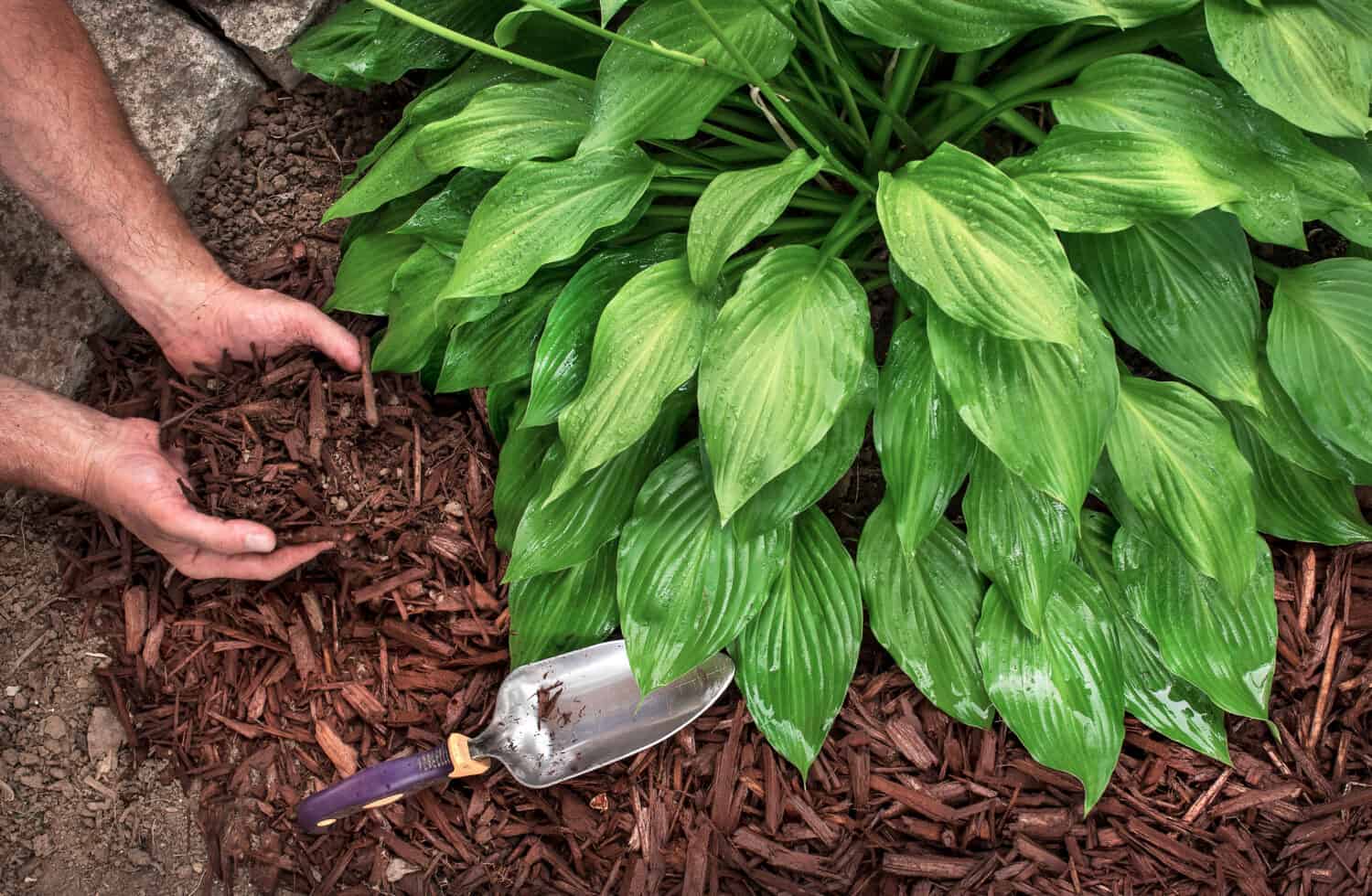
Organic mulch provides consistent nutrition to plants over time as they decompose.
©Jon Rehg/Shutterstock.com
One of the crucial benefits of organic mulch is its ability to prevent topsoil from drying out. Topsoil is the uppermost layer of soil. It is rich in nutrients and vital for plant growth. Maintaining its moisture content is paramount for healthy plant development.
Organic mulch acts as a protective barrier, shielding the topsoil from the drying effects of sun and wind. By covering the soil’s surface, it reduces the exposure of topsoil to these elements, preventing rapid water evaporation.
In addition to conserving moisture, organic mulch contributes to soil health by providing a steady supply of nutrients as it decomposes. This nutrient enrichment ensures that the topsoil remains fertile and conducive to plant growth, making it an essential asset for gardeners who value the well-being of their soil and plants through more natural methods.
By choosing organic mulch, you take a significant step towards preserving the integrity of your topsoil, promoting a thriving garden, and embracing sustainable landscaping practices.
5. Organic Mulch is Excellent at Regulating Soil Temperature
The regulation of soil temperature is a critical aspect of successful gardening and landscaping, and organic mulch excels in this regard. It serves as a natural insulator, helping to maintain a stable and favorable temperature for plant root systems.
During hot summer months, organic mulch acts as a shield, preventing excessive heating of the soil. By reducing the direct impact of sunlight on the ground, it keeps the temperature within a range that is more comfortable for plant roots. This regulation is essential to prevent heat stress and root damage, ensuring healthier and more robust plant growth.
In colder climates, organic mulch provides insulation against freezing temperatures. It helps to moderate soil temperature, preventing the soil from becoming too cold and protecting roots from frost damage.
By choosing organic mulch, you create an environment that mimics the natural conditions in which plants thrive. This temperature regulation aspect is a testament to its role in fostering a garden that lives in harmony with the Earth, ensuring the well-being of your plants year-round.
6. Organic Mulch Helps With Soil Erosion Control
Organic mulch plays a crucial role in controlling soil erosion, making it an essential choice for maintaining the integrity of your yard or garden. Soil erosion occurs when topsoil is washed or blown away, often due to heavy rain, wind, or improper land management practices. This erosion can lead to the loss of valuable topsoil and harm the environment.
Organic mulch forms a protective barrier on the soil’s surface. Additionally, it helps to anchor the soil, keeping it in place during heavy rainfall or windy conditions. By stabilizing the soil, organic mulch safeguards against erosion and the loss of precious topsoil, which is rich in nutrients and vital for plant growth.
Incorporating organic mulch into your landscaping promotes a lush and healthy garden and contributes to sustainable land management, ensuring your yard remains ecologically responsible.
7. Organic Mulch Helps With Weed Suppression

Landscaping with organic mulch and native plants supports the local ecosystem and ensures optimal growth and survival.
©Ingrid Balabanova/Shutterstock.com
Organic mulch can be an ally in the battle against weeds, providing effective and natural weed suppression in your yard or garden. Weeds can be a persistent nuisance, competing with desirable plants for resources like sunlight, water, and nutrients. Organic mulch offers several mechanisms for keeping weeds at bay.
First, it forms a physical barrier that obstructs weed growth by blocking sunlight from reaching the soil’s surface. This inhibits weed germination and reduces the need for chemical herbicides, aligning with eco-friendly gardening practices.
Second, as organic mulch decomposes, it releases compounds that can deter weed growth and root development. This natural weed control method ensures a healthier and less labor-intensive garden, as you spend less time battling invasive plants.
Organic mulch helps you not only maintain a cleaner and more visually appealing landscape but also contribute to the conservation of the natural world by reducing the reliance on synthetic chemicals or materials.
8. Organic Mulch Protects Your Plants From Competition
For the above reason, organic mulch is a protective shield for your plants, guarding them against competition from weeds and other vegetation for essential resources. In a garden or landscaping setting, plants often vie for sunlight, water, and nutrients, which can hinder their growth and vitality.
By creating a beneficial barrier, organic mulch ensures that your established plants have priority access to these vital resources. This protection is especially valuable for young or newly planted specimens that may be more vulnerable to competition.
Furthermore, organic mulch’s ability to conserve moisture and enhance soil fertility contributes to a thriving environment for your plants. It creates a balanced ecosystem in which your chosen flora can flourish without the interference of aggressive weeds or other invasive vegetation.
In essence, organic mulch acts as a guardian, shielding your plants from the challenges posed by competing organisms and enabling them to thrive in a nurturing and harmonious landscape.
9. Organic Mulch Provides the Ultimate Soil Enrichment
The strongest factor of organic mulch is its soil enrichment properties. Organic mulch is a natural source of soil enrichment, providing a consistent supply of nutrients to your plants. As it decomposes over time, it releases essential elements like nitrogen, phosphorus, and potassium into the soil, enhancing its fertility.
This continuous nutrient supply is invaluable for plant growth and development. It ensures that your plants receive a steady and balanced diet of nutrients, which promotes healthy foliage, robust root systems, and vibrant blooms or fruits.
Furthermore, organic mulch enriches the soil with organic matter, improving its structure and water-holding capacity. This is particularly beneficial for clay or sandy soils, as it enhances their ability to retain moisture and nutrients.
This helps you create an environment where your plants can thrive and flourish. It’s a sustainable and eco-friendly way to provide your garden with the nourishment it needs while minimizing the use of synthetic fertilizers.
10. Organic Mulch Increases Bioavailability
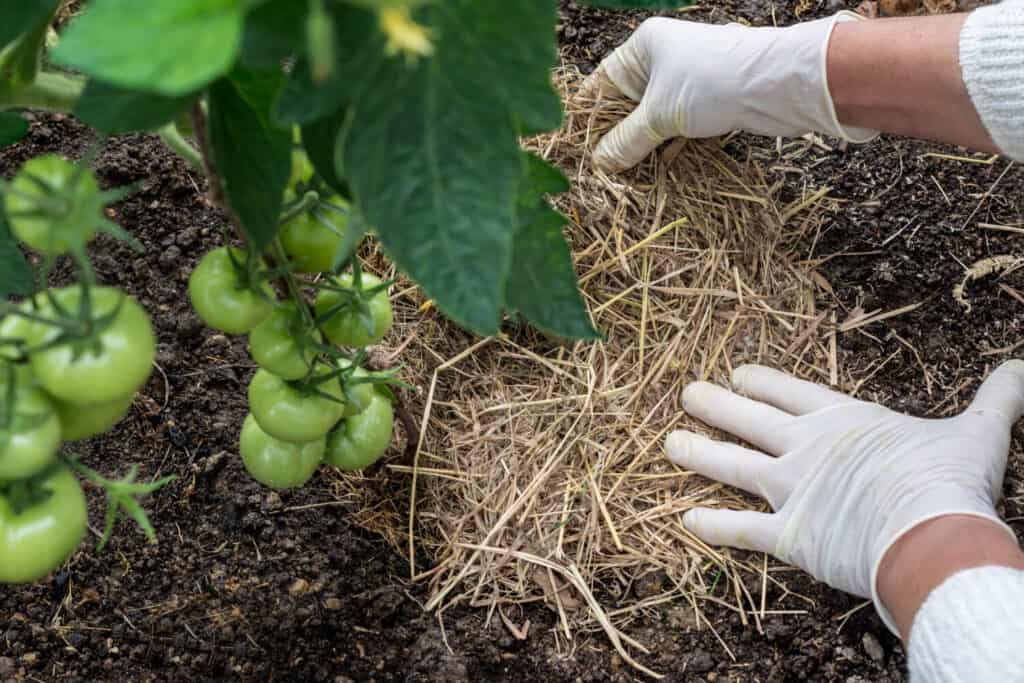
One of the best qualities of organic mulch is that it provides protection for your plants.
©Jurga Jot/Shutterstock.com
Organic mulch contributes to increased bioavailability of nutrients in the soil, a key factor in fostering healthy plant growth. Bioavailability refers to the ease with which plants can access and absorb nutrients from the soil. Organic mulch enhances this accessibility in several ways.
Organic mulch fosters a thriving community of beneficial microorganisms and organisms that play a pivotal role in enhancing nutrient bioavailability for plants. Both are essential components of a healthy soil ecosystem and work in tandem with organic mulch to create an environment where plants can access and utilize nutrients more effectively.
Microorganisms
Organic mulch, such as compost or well-rotted leaves, provides an ideal habitat for a diverse array of beneficial microorganisms. This includes bacteria, fungi, and other soil-dwelling organisms that form what is known as the soil food web. These microorganisms are responsible for breaking down the organic mulch material as it decomposes. During this process, they convert complex organic matter into simpler forms, such as soluble nutrients and organic acids. This breakdown is a crucial step in making nutrients more accessible to plant roots.
Furthermore, the microorganisms also engage in nutrient transformation. For example, nitrogen-fixing bacteria can convert atmospheric nitrogen into a form that plants can use for growth. Mycorrhizal fungi form symbiotic relationships with plant roots, extending their reach and helping them access nutrients like phosphorus and micronutrients. As the microorganisms work through the organic mulch and surrounding soil, they create channels and pores that improve soil structure. This enhanced structure allows for better water infiltration, root penetration, and movement of nutrients. Some beneficial microorganisms also act as natural antagonists to plant pathogens. They can help suppress soil-borne diseases, reducing the need for pesticides.
Other Organisms
As for larger organisms, earthworms improve soil structure and fertility through their burrowing and nutrient-rich castings. Arthropods like beetles and ants aid in organic matter decomposition, contributing to nutrient cycling. Beneficial nematodes help control soil pests, reducing the need for pesticides. Beneficial insects like ladybugs and lacewings are attracted to this habitat, aiding in natural pest management. Even small mammals and their activities can contribute to a balanced ecosystem. Together, these organisms create a thriving and harmonious environment, making organic mulch an integral part of sustainable gardening practices.
11. Organic Mulch Aids in Nutrient Cycling
Related to the above reason, organic mulch is a champion of nutrient cycling in your yard or garden, and here’s why it’s a vital reason to choose it. As organic mulch decomposes, it releases valuable nutrients into the soil. These nutrients, including nitrogen, phosphorus, and potassium, are essential for plant growth.
The decomposed mulch doesn’t just provide nutrients. It also encourages a healthy population of beneficial microorganisms. These microorganisms break down organic matter further, converting it into forms that plants can readily absorb. In this process, they release nutrients and improve soil structure and aeration.
This nutrient recycling system reduces the need for synthetic fertilizers, minimizing the risk of nutrient runoff and pollution. It embodies sustainable gardening practices that promote ecological balance while nurturing your plants with a continuous and natural supply of nutrients.
12. Organic Mulch Provides Sustainable Resource Management
Opting for organic mulch is a choice that aligns with sustainable resource management principles. Organic mulch can be sourced from renewable and eco-friendly materials like wood chips, bark, pine needles, leaves, and compost. By using these materials, you support responsible resource management and reduce the demand for non-renewable resources used in inorganic mulch materials like rubber or plastic mulch.
Furthermore, organic mulch contributes to a closed-loop system in your yard or garden. As it decomposes, organic mulch enriches the soil with nutrients and organic matter, enhancing soil fertility. This, in turn, promotes a self-sustaining ecosystem.
Organic mulch also aids in reducing organic waste sent to landfills, as much of yard waste can be transformed into mulch. This reduces the environmental burden associated with waste disposal and encourages recycling at the hyper-local level.
13. Organic Mulch Has a Natural Aesthetic Appeal
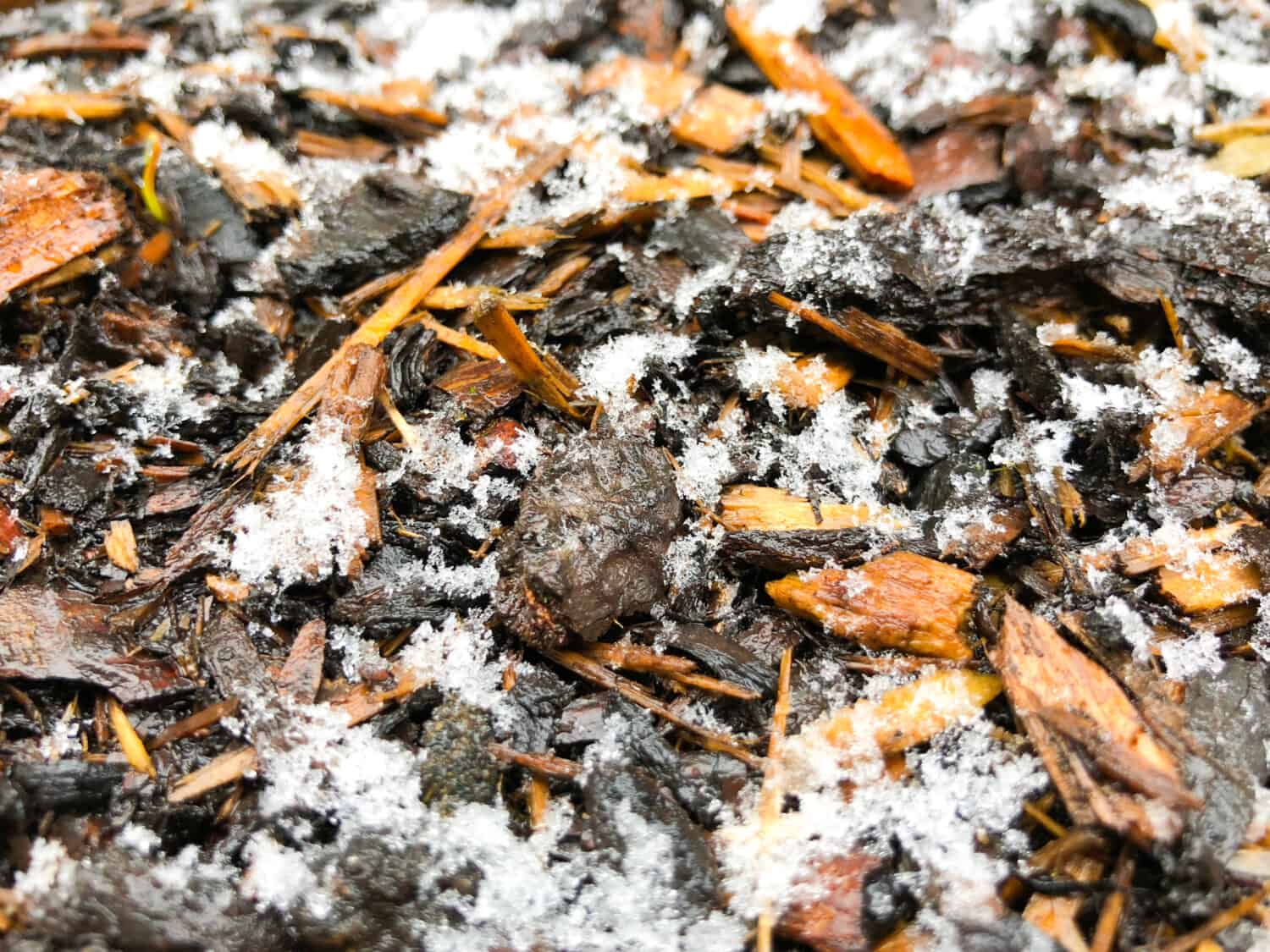
Not surprisingly, organic mulch provides insulation to root systems of plants during the winter.
©Ilaha Aliyeva/Shutterstock.com
Beyond its numerous practical benefits, organic mulch adds a touch of natural beauty and organic aesthetic appeal to your yard or garden. Its earthy textures and tones seamlessly blend with the surrounding environment, creating an inviting and harmonious outdoor space.
Mulch, in general, can serve as a backdrop that enhances the visual appeal of your plants and landscaping features. Organic mulch, as a natural material from nature, provides the ultimate natural accent with a human-influenced design. Whether highlighting the vibrant colors of flowers, framing the elegance of shrubs, or accentuating the structure of trees, organic mulch adds a layer of visual interest that complements the natural world.
Moreover, organic mulch can be used to define garden beds, pathways, or borders, adding structure and organization to your landscape design. It creates a cohesive, well-maintained appearance that appeals to the senses and evokes a sense of organization.
Incorporating organic mulch into your yard nurtures your plants and elevates the overall aesthetics, transforming your outdoor space into a picturesque and inviting haven.
14. Organic Mulch is More Eco-Friendly
Choosing organic mulch is a conscious and eco-friendly decision that resonates with individuals who care about the environment and conservation. Organic mulch embodies several eco-friendly principles that make it an environmentally responsible choice.
Firstly, organic mulch is derived from natural and renewable sources like leaves, wood chips, and compost. Organic mulch reduces the demand for non-renewable resources or resources that are difficult to harvest. Furthermore, organic mulches break down over time, are readily available or can be self-harvested, and do not leach harmful chemicals into the environment.
Secondly, organic mulch enhances soil health by improving its fertility and structure through nutrient cycling and the incorporation of organic matter, as extensively covered in this article.
Additionally, organic mulch supports chemical-free gardening practices that protect local ecosystems by aiding in weed suppression without the use of harmful herbicides.
15. Organic Mulch Reduces Lawn Mowing
Organic mulch can significantly reduce the need for frequent lawn mowing, making it a practical and time-saving choice for homeowners. When appropriately applied, organic mulch forms a protective layer over the soil, inhibiting the growth of grass and weeds beneath it.
This reduction in lawn maintenance has several advantages. First, it saves you time and effort spent on mowing and trimming, allowing you to enjoy a beautiful yard without the constant need for upkeep.
Second, less or omitted lawn mowing contributes to lower fuel consumption and emissions from lawn mowers, promoting environmental conservation and reducing your carbon footprint.
Furthermore, organic mulch creates a neat and well-defined landscape, reducing the need for edging and maintaining the edges of your lawn.
By incorporating organic mulch into your yard, you enjoy the benefits of reduced lawn maintenance and support a more sustainable and natural approach to landscaping.
16. Organic Mulch is Less Expensive
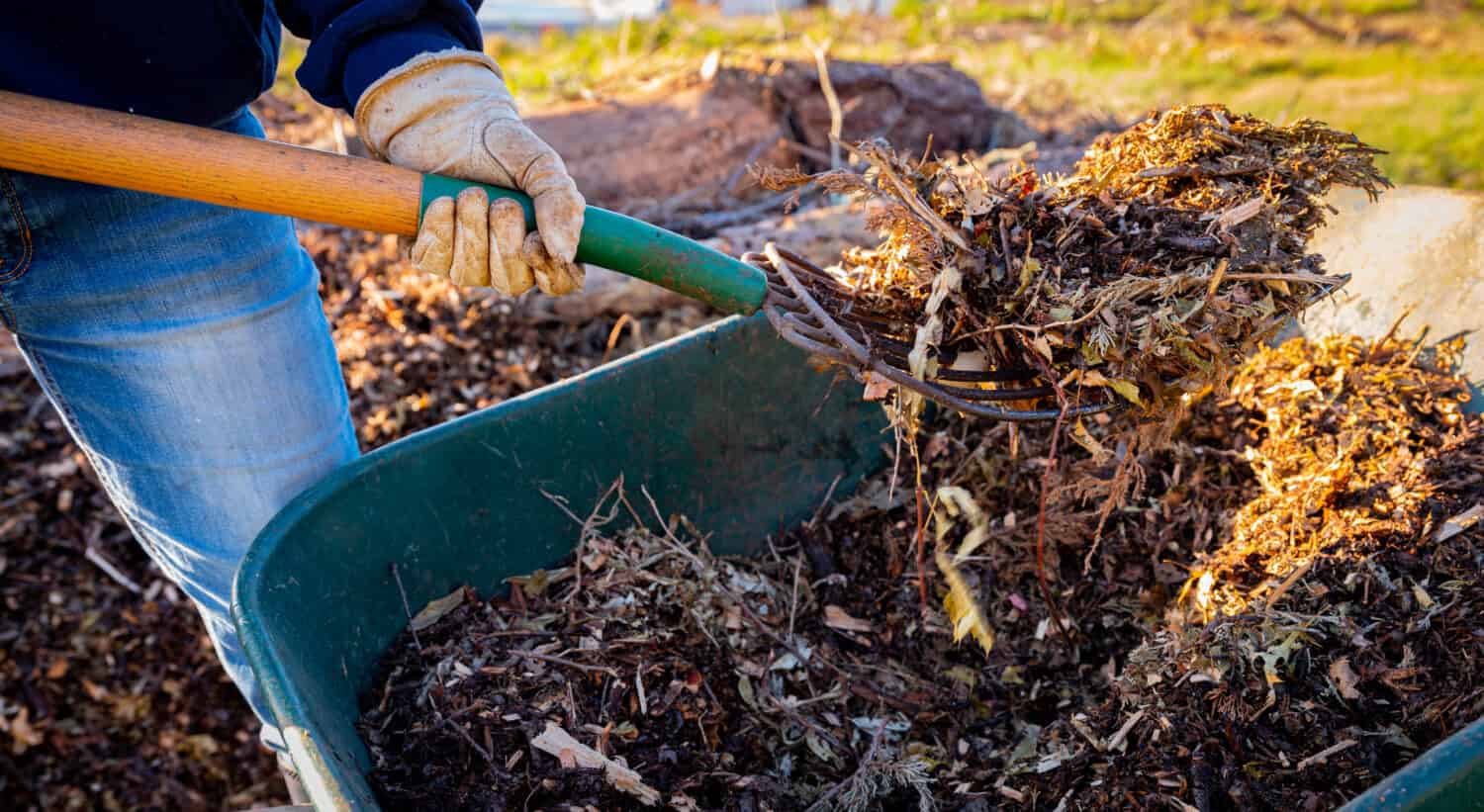
Organic mulch can be eco-friendly and cost-effective, especially if you source your own organic mulch.
©NayaDadara/Shutterstock.com
Regarding initial and upfront costs, choosing organic mulch offers a cost-effective solution for landscaping and gardening, making it a financially prudent choice. Organic mulch is typically more affordable than inorganic mulch materials like stone or synthetic mulch.
One of the significant cost savings comes from reduced maintenance requirements with specific factors. Organic mulch suppresses weed growth naturally, reducing the need for herbicides or extensive manual weeding efforts. This translates into fewer ongoing expenses for weed control.
Additionally, organic mulch contributes to soil health and fertility, reducing the need for expensive synthetic fertilizers. Over time, as the mulch decomposes, it provides a continuous supply of nutrients to your plants, further decreasing your gardening expenses.
Furthermore, organic mulch can be sourced locally or even created from yard waste, which often results in lower transportation and disposal costs.
If you purchase organic mulch from a supplier, costs can add up over time compared to inorganic mulch, which rarely needs to be topped off. Regardless, the many benefits are worth the maintenance required every one to four years.
The photo featured at the top of this post is © iStock.com/witmerphotography
Thank you for reading! Have some feedback for us? Contact the AZ Animals editorial team.



